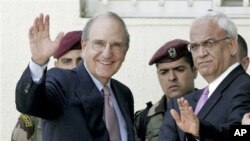U.S. special envoy George Mitchell is extending his stay in the Middle East as he works to avert a collapse of the month-old Middle East peace talks.
Mitchell was originally scheduled to leave the region after meeting with Israeli and Palestinian leaders, but decided to stay longer following his meeting with Palestinian President Mahmoud Abbas.
Diplomats described his decision to stay longer as a positive sign.
At the start of his meeting with Mr. Abbas, Mitchell said the Obama administration will persist with its efforts to keep the talks on track. "We are determined to continue and we are continuing our effort to find common ground between the parties, to enable the direct negotiations to continue," he said.
In his bid to keep both sides at the table, the U.S. official is shuttling between Jerusalem and the West Bank. Officials said Mitchell would hold meetings with Israeli leaders before returning to the West Bank on Friday.
The Palestinians have threatened to quit talks unless Israel restarts a freeze on construction at Jewish settlements in the occupied West Bank. Israel says it wants negotiations without preconditions.
Before Mitchell's meeting with President Abbas, Palestinian senior negotiator Nabil Shaath said the Palestinians should not remain in talks unless Israel stops building in the settlements.
Speaking a day before the meeting, Shaath said the Palestinians are willing to accept a four-month freeze on building, during which both sides can negotiate borders and the possible future removal of settlements. He said they will not accept anything less than what the recently expired freeze provided.
"The moratorium is already watered down," said Shaath. "Any further watering down of that moratorium resolution will really result in an absolutely non-committal and non-productive sort of settlement."
Israel's self-imposed 10-month slowdown on construction that expired Sunday banned the construction of new homes in the settlements. It allowed for building of schools and other public facilities, and permitted completion of projects that were in progress.
Joining the effort to keep talks from derailing was the European Union's foreign affairs chief, Catherine Aston.
All sides are working toward an October 6th deadline. That is when President Abbas plans to consult with Arab foreign ministers meeting in Cairo, before announcing his decision on whether to continue negotiations.









